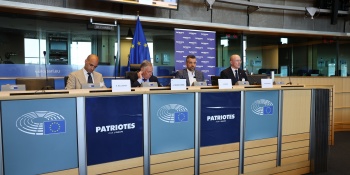Published: 22.11.2021

· The European Court of Human Rights receives complaints trying to abolish the ruling of the Polish Constitutional Tribunal of 22 October last year and undermine the ban on eugenic abortion in Poland.
· Ordo Iuris Institute became a party in the ECtHR proceedings relating to these complaints, by presenting an amicus curiae opinion.
· The opinion notes that no international law gives anyone the right to abortion.
· There are, however, many international treaties which directly give each human being the right to live.
In July of this year, the European Court of Human Rights issued a formal notice to the Polish government of the receipt of twelve complaints against the ban on eugenic abortion in Poland. This is connected with the Constitutional Tribunal’s ruling of 20 October 2020 stating that the possibility of abortion due to the “serious chance of grave and irreversible foetal impairment or an incurable disease threatening its life” (which included such diseases as Dawn’s syndrome) is unconstitutional, in particular, is contrary to each human being’s right to live. Since then, eugenic abortion has become illegal in Poland.
In the complaints submitted to the ECtHR, a group of twelve women of different age indicated the “potential infringement” of their right to respect private and family life (Article 8 of the European Convention on Human Rights). One of the complainants claims that shortly before the Constitutional Tribunal’s ruling, she “discovered that she was pregnant” and that “she felt very anxious until she received the test results.” Another woman writes in her complaint that although “she takes contraceptives and does not plan pregnancy” due to bad health, she is still “very worried that the Constitutional Tribunal’s ruling will have an impact on her situation.” All the women complain that they could become pregnant one day with a baby that is disabled.
Ordo Iuris Institute immediately requested that the Tribunal admitted it to the proceedings as amicus curiae. In mid-October, the President of Section One of the European Court of Human Rights, Judge Ksenija Turković, issued a permission. At the beginning of November, Ordo Iuris Institute sent the amicus curiae opinion to the Tribunal in Strasbourg.
The opinion included a reminder that none of the international human right treaties gives anyone the right to abortion; however, nearly each one of them gives everyone the right to live (Article 2 of the European Convention of Human Rights, Article 6(1) of the International Covenant on Civil and Political Rights, Article 6 of the UN Convention on the Rights of the Child). It also quoted the opinion of UN Committee on the Rights of Persons with Disabilities, according to which the laws allowing abortion due to a child’s disability are incompatible with Articles 4, 5 and 8 of the Convention on the Rights of Persons with Disabilities.
“Our information indicates that the ECtHR continues to receive new complaints against the protection of the lives of unborn disabled children. We monitor the situation on an ongoing basis and we will intervene in future cases of this kind. In the current line of jurisprudence, ECtHR has been taking a peculiar stance; on the one hand it claims that unborn children do not have the right to live, but on the other hand, it recognises that the Convention does not give anyone the right to abortion, either. In ECtHR’s opinion, the question of legalising or banning abortion lies within the so-called margin of discretion of the Member States. So far, the Tribunal has been dismissing the complaints which directly tried to question the national law banning abortion in specific cases,” said Weronika Przebierała, Director of the Centre for International Law of the Ordo Iuris Institute.

Wednesday's presentation in Brussels of the European Union reform plan developed by Poland’s Ordo Iuris Institute and Hungary’s Mathias Corvinus Collegium garnered significant interest. Nearly a hundred MEPs and their staff from many countries came to the presentation of this proposal.

• Amendments to the directive on the rights of victims of crime are currently under consideration in the European Parliament.

The candidate supported last Sunday by all the Right for the second round of the Polish presidential election had promised that he would veto any law that liberalizes abortion. He won with 50.89% of the votes against the left-liberal candidate who had promised to ratify any law liberalizing abortion.

• The pressure on the European Union’s southern borders has continued unabated since the great migration crisis of 2015.